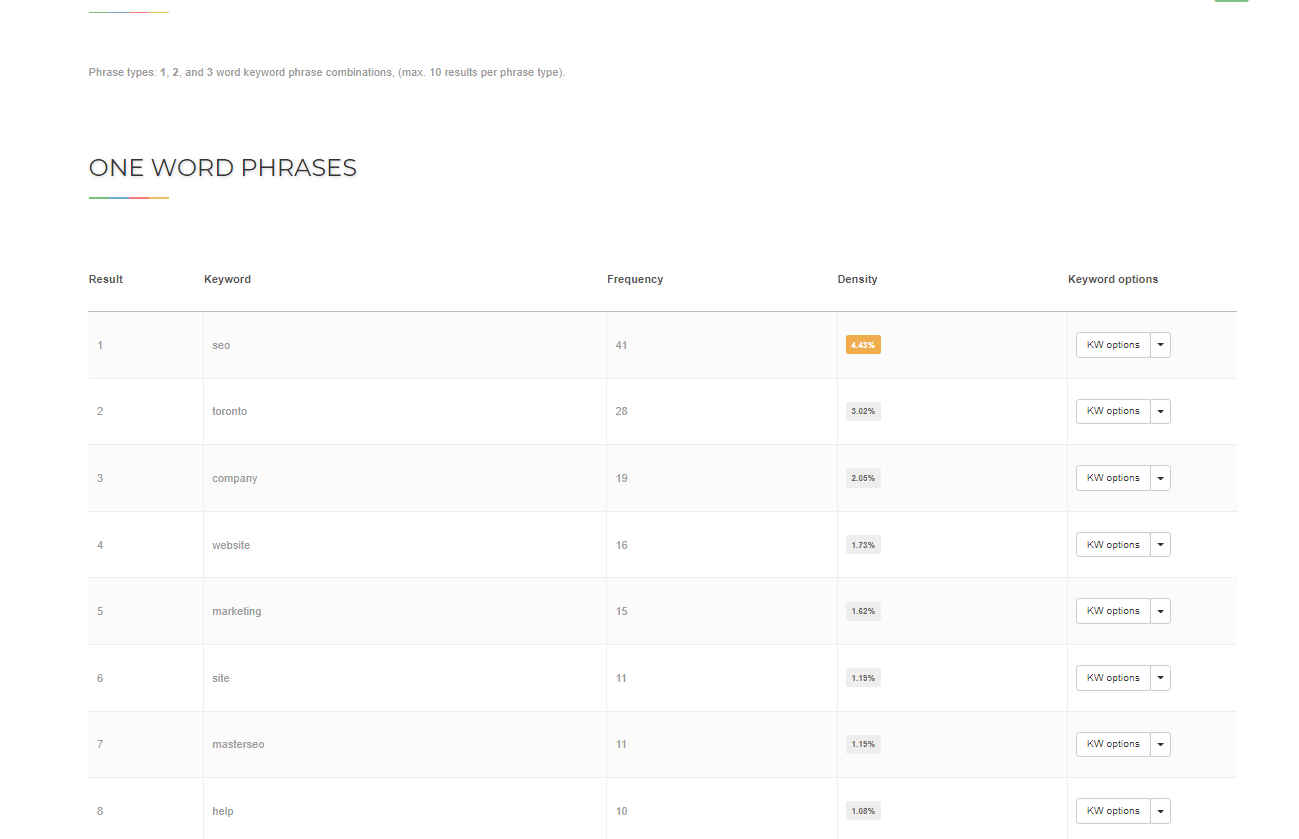Not all blog posts are SEO content, and pouring your heart and soul into your content doesn’t guarantee rankings and traffic. SEO writing is an art form unto itself, with best practices that will help you rank higher than your competitors. It’s about producing content that satisfies the wants and needs of readers and search engine algorithms.
Keywords are a powerful tool for web marketing and can significantly influence your blog’s search engine rankings. To get more people viewing your articles, you need to use the relevant keyword phrases in your articles. This isn’t just a matter of keywords used in titles and headers of your articles; you also need to be using keywords in the article’s content for people to read it. SEO writing entails creating highly SEO optimized, keywords-rich articles or blog posts that will help a website rank higher on search engines.
Table of Contents
Key SEO Terms, Defined
Since SEO itself is an acronym, it is not surprising that our industry is full of jargon. And even Google can’t break through some of them. We have compiled a glossary of SEO terms to make things a little less mysterious.
Algorithm
An algorithm describes the system or process through which a search engine creates a list of results to show a user. The algorithm is controlled by the search engine and is constantly being modified to improve the efficiency and accuracy of search results.
Alt Tag
An HTML attribute within an image tag contains a text label, keyword or description for the image. Although the alt tag is not displayed on the page, it is used by search engines to determine what images are relevant.
Authority
The authority can be divided into Page Authority and Domain Authority:
Page Authority is a score (out of 100) that predicts how well a specific page will be ranked in search engines.
Domain Authority is a score (out of 100) that predicts how well a website will be ranked in search engines. Domain authority is helpful when comparing one site with another or tracking your site’s authority over time.
Backlinks
Links from other websites to your simply means authority votes. Backlinks help search engines determine how important a website is and can be used as a bidding tool by SEOs or webmasters to improve their site’s ranking in a search engine’s results pages.
Black hat
Refers to search engine manipulation practices that break search engine algorithm rules. Such practices are prohibited by Google and the major search engines, penalized by Google.
Bots
It is a software application that performs a variety of tasks, from autonomous movements to complex calculations. In search engine optimization, bots are used to crawl the web and index websites.
Citation
In SEO, citations are links from other sites that link back to your page.
Content
The main idea behind SEO writing is to create a high quality content that readers will enjoy and search engine spiders will understand and retain. The more keyword’s rich information about your product or services you can provide on a webpage, the better it will rank.
Crawlers
Crawlers are bots that search engines have programmed to crawl the Internet and find pages on the World Wide Web. A crawler can access websites by supplying a Uniform Resource Locator address or URL.
External links
Links to other web pages that you can find on a page. These links may be to other parts of your own website, or to another site entirely.
Google Ads
Adwords is a search engine marketing service that enables online advertisers to pay for keywords that will appear in Google’s search results. Advertisers choose which keywords to bid on and what they will pay per click.
KPI
A key performance indicator is a target that is established to measure the effectiveness of an activity.
Link Building
Simply means a strategy used to increase the popularity and authority of a web page by attracting links from other reputable websites to your web page.
Meta Description
A meta description is a brief description of the website content displayed in search engine results under a title and link. Meta descriptions are shown in search engine results and on summary web pages such as Google and Bing.
Nofollow
A nofollow attribute is used to prevent search engines from counting the link as a vote towards the site’s ranking.
Organic
A site that has been growing its traffic over time by the quality of content and its relevance to web users is said to be naturally “organic.”
On-page SEO
The set of best practices that helps search engines understand the content of a web page. On-page SEO involves improving the overall quality of your website by making sure the content is fresh, relevant and up-to-date.
Off-page SEO
Off-page SEO is the process of raising your site’s popularity or link popularity by getting links from other popular sites. This is usually done by creating an article, post or forum thread on a popular website.
Internal links
Links within a web page, to other pages within a website. Internal links build value and authority for your site, and should be used accordingly.
PageRank (PR)
PageRank is a measurement of the authority (or popularity) assigned to an internet page. The higher the PageRank, the more popular and trusted the page. Google assigns a numeric PageRank score to each page on the web. The score is based on the number and quality of links to a particular website.
Robots.txt
It is a text file that controls the behaviour of web browsers when human users are not actively using them.
Search engine
A search engine is a website that serves as an intermediary between the user and the information on the World Wide Web.
Search Engine Optimization (SEO)
Search Engine Optimization is the process of improving the ranking of a web page in search engines. It involves consistent content strategy, on-page optimization, off- page optimization, competitive research and link building. SEO should be a core part of every marketing strategy.
Social Media Management
It is a digital marketing methods that involves the promotion of a company, product or service within the social networks such as Facebook, Instagram, Twitter, LinkedIn, etc.
Spider
A spider is a program that systematically browses the websites found on the World Wide Web, looking for pages that contain links to other sites.
SERP
Search Engine Results Page is a list of web pages displayed when someone enters a query in a search engine. It contains the results of the search query entered by the searcher.
URL
URL is a Uniform Resource Locator or a location on the Internet. In other words, a website name and web page address.
Webmaster guidelines
Webmaster guidelines (or Webmaster Tools) are a set of recommendations for how to use and optimize a Web site for search engines. The SEO specialist should list these recommendations every time you submit an article or blog post to a website or blog platform.
White hat
White hat SEO techniques are the ideal ways to build up traffic to your website. White hat SEO goes beyond what is generally acceptable, but it doesn’t involve any unethical or unwanted strategies that Google can penalize.
Start with your goals
SEO writing is a part of your revenue online strategy. Before you can start planning your content, you need to know what the overall SEO goals are. What you want to achieve through your SEO writing is what will determine the content that will be relevant and useful enough to achieve a better conversion rate. You can plan to get it by knowing what type of content will help you reach your goals and whether your goal involves bettering user experience through an improved search engine result ranking.
What Is An SEO Copywriter?
An SEO copywriter uses search engine optimization strategies to write copies that help increase the site’s ranking in search engines. When writing a text, SEO copywriters consider the density and significance of keywords, tone, style and readability, which helps improve search engine optimization (SEO) rankings and lower bounce rate. It’s often done through rewriting existing text or creating original content to make it more attractive for people and search engines. The role can also entail using correct grammar so that there are no errors in capitalization or misspellings. For example, such a keyword as the “attorney” does not exist in common law in Canada. They are properly called “solicitors and barristers” but should not be referred to as “attorneys” because there is a different meaning of “attorney” in Canada. An experienced copywriter will avoid such simple mistakes by knowing the different variations in Canadian spelling and usage.
If you are a company founder, then you have likely come to understand the significance of SEO content. What is often misunderstood as just how essential it can be and why one should invest in quality SEO content. The goal of original and informative blog posts is to rank higher on search engine listings and thus get more traffic from readers looking for related information. The following are three key reasons why one should invest in quality SEO writing:
- Content is king—or queen, whatever you prefer or how you interpret it. Since the dawn of the Internet, this has been true, and it likely will be valid for many years to come. There will always be a need for quality and informative types of content that people want to read and that they desire to share with others through their blog posts or other social media outlets.
- Quality content is engaging and can contribute to attracting and growing a loyal audience. Many people desire to create a consistent blogging schedule, but they do it without the intention of getting many views. That is not what SEO optimized content is about. You should be prepared to make an investment of your own time or funds in order to find success. If you really want to rank high on search engines and attract traffic, then you need quality content centred around a single theme or topic.
- Quality SEO content encourages greater search engine indexing and ranking for a web page or a blog. Your SEO content should be of high quality if you want to be noticed, especially by search engines that are trying to gather information on keywords that people desire.
Whatever your reasons may be for wanting to invest in quality SEO writing, it is wise for you to understand the importance of doing so. When done correctly and used effectively, your content will bring you more business and profit while benefiting your audience as well.
Strategic, not stuffy: Relevant keywords density
A good keyword density is 4-5%. If your title or headline is a single keyword phrase, use a lower density of 1-3%.
By all means, use the target keywords in the article’s title if you’re writing about something that a single word can easily describe. But make sure to use them in the article’s body as well. Otherwise, your reader will be left scratching their head trying to figure out what it is you wanted them to know.
One of the best ways to engage your readers to pay attention to your content is to use a question in the title of an article. This engages readers in a conversation, and they end up clicking through to find the answer. This strategy works particularly well if your content is very long or difficult to understand.
When To Hire an Search Engine Optimization Copywriter
Writing authoritative content can be challenging for business owners who are not experienced writers. When creating marketing materials, including emails and website updates, you’ll need someone skilled at writing compelling content that will encourage customers to buy your product or click on your ad. You should hire an SEO copywriter if:
- You’re a small business owner, entrepreneur or blogger
- You are investing in an advertising campaign
- You want to freshen your business brand
- You are having problems with your online presence
As soon as you face one of those points, it is time to hire a professional SEO copywriter. A content Guru will help you with all those problems and give you awesome content that brings high ROI.
What Skills Should SEO Content Writer Have?
There are many basic SEO concepts that content writers should be familiar with if they intend to do their job well by creating relevant content that suits their customers. Below are some of the essential skills that a content writer should have:
- be fluent in English
- strong command of grammar and spelling
- knowledge of all major types of writing, including plain text, lists, charts, graphs
- excellent research and note-taking skills
- strong analytical and critical thinking capabilities
- ability to meet deadlines and communicate professionally
Content writers should know how to write well, but their writing skills are just one of many talents needed.
It’s essential to have research skills, SEO knowledge, adaptability, having a consistent writing style and staying current to write content that is search engine friendly and fits your customer’s needs and expectations.
What Are Keyword Phrases?
Just as a keyword is a single word used as a search query, a keyword is two, three, or even more words entered as a search query. For example, “criminal defence lawyer impaired driving” is an excellent example of a keyword phrase. Ideally, keyword phrases will produce results that are better than using one or two words.
Search engine users find what they are looking for by searching for specific keywords phrases and choosing the most relevant result, so don’t hesitate yo use keyword research tool. You want your site to have as many opportunities as possible to be included in these search results. In other words, you should try all the keyword cluster phrases that you can. For example, “criminal defence lawyer impaired driving” will produce results better than just using “criminal defence lawyer.”
When optimizing your website, it’s important to be aware of phrases your potential customers use when searching for your type of business. Think about the questions that people may ask about your business and incorporate those keywords into your copy. Focus on writing for people, not only search engines.
58 % of search queries consist of three words or more. Thus, keywords on your site increase your chances of being higher in the page ranking (because more keywords match the search query).
Best Practices for SEO Content Writing
-
Write for your audience first.
When you are trying to write an SEO-friendly article, the first thing to do is to know your audience. Who are they? What is their market? Is it part of a niche market? Make sure this information is at the forefront of your mind.
-
Optimize the title.
The title of your article is the first thing a reader will see, so it’s essential to make it as appealing as possible. You can do this by using keywords or phrases that include intent, need, or desire. For example, articles for a children’s toy store should have titles such as “All About Lego Sets.”
-
Consistent writing style to break up long sections of text.
Headings can add structure to your article, making it easier for the reader to take in the main points. The use of headings should make you think about what you want your writing to be about and what the key messages are in this piece.
-
Use long tail and short tail keywords.
You can find many keyword ideas on your competitor’s websites or by using a keyword tool. The use of long-tail keywords helps create more natural language in your writing and gives it a better flow. Make sure the reader feels that the article is written for them, not just with them in mind.
-
Write easy-to-scan posts with list posts, infographics, and bullet points.
Use this style to make a post easy to read and follow. In addition, make sure you write using short sentences and short paragraphs. The idea is to make it easy to read and follow. Use numbered lists or bullet points for this purpose.










